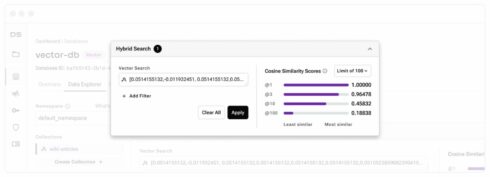
DataStax has announced that it has revamped the developer experience for Astra DB, which is a vector database used for building AI applications.
First, it is releasing a new API for building generative AI applications: the Astra DB Data API. This new API helps developers create these apps by providing all of the necessary data and integrations with major generative AI companies, like Azure, Amazon Bedrock, GitHub Copilot, Google Vertex AI, LangChain, LLamaIndex, OpenAI, and Vercel.
Data API features a schema-less, document-based approach to APIs, which helps enable easy access to both structured and unstructured data, according to the company.
According to DataStax, the new API also includes an intuitive dashboard and efficient data loading and exploration tools.
The company also added new client libraries for Python, TypeScript, and Java. The new libraries are also designed to help developers get started with generative AI more easily, DataStax explained.
Another update is a revamped Data Explorer, which allows developers with limited Cassandra Query Language knowledge to integrate data into their applications. Using Data Explorer, developers can conduct vector-based searches that return a ranked list of up to 100 results, which is particularly useful for AI agent use cases.
And finally, the company has also updated its documentation to be more user-friendly. The new documentation is intended to act as more of a guide, rather than just a repository of knowledge. This means tailoring it more to specific stages of development so that developers can get just the information they need without any unnecessary details for that point in time, according to DataStax.
“In sum, the new Data API and the enhancements in the Astra developer experience, including the intuitive client libraries, the versatile Data Explorer, and our streamlined documentation, underscore our commitment to making the developer journey in GenAI applications as straightforward and efficient as possible,” Silas Sao, senior director of product experience at DataStax, and Val Kulichenko, database product lead at DataStax, wrote in a blog post.





